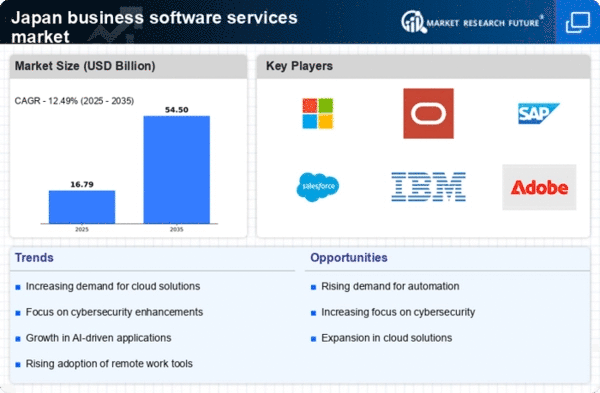Rising Demand for Remote Work Solutions
The business software-services market in Japan is experiencing a notable increase in demand for remote work solutions. This shift is driven by the need for businesses to maintain operational continuity while ensuring employee safety and productivity. As of 2025, approximately 60% of companies in Japan have adopted some form of remote work technology, indicating a significant transformation in workplace dynamics. The integration of collaboration tools, project management software, and virtual communication platforms has become essential. This trend is likely to continue, as organizations seek to enhance flexibility and attract talent. The business software-services market is thus positioned to benefit from this ongoing evolution, with companies investing in innovative solutions to support remote work environments.
Growing Emphasis on Data Privacy Regulations
Stringent data privacy regulations increasingly influence the business software-services market in Japan. With the implementation of laws such as the Act on the Protection of Personal Information (APPI), companies are compelled to adopt software solutions that ensure compliance and protect consumer data. As of 2025, around 70% of businesses in Japan are prioritizing data privacy in their software investments, reflecting a broader trend towards responsible data management. This regulatory landscape is driving demand for software services that offer robust security features and compliance tools. Consequently, the business software-services market is likely to expand as organizations seek to align their operations with evolving legal requirements.
Increased Investment in Automation Technologies
Automation technologies are becoming increasingly vital within the business software-services market in Japan. Companies are recognizing the potential of automation to streamline operations, reduce costs, and enhance efficiency. In 2025, it is estimated that the market for automation software will grow by 25%, reflecting a strong trend towards adopting robotic process automation (RPA) and intelligent automation solutions. This shift is not only about improving productivity but also about enabling businesses to focus on strategic initiatives rather than routine tasks. As organizations in Japan continue to embrace automation, the business software-services market is likely to see a surge in demand for software solutions that facilitate these advancements.
Shift Towards Subscription-Based Software Models
A significant shift towards subscription-based software models is occurring in the business software-services market in Japan. This trend is largely driven by the desire for cost-effective solutions that provide flexibility and scalability. As of 2025, it is projected that subscription services will account for over 50% of the software market in Japan, as businesses prefer to avoid large upfront costs associated with traditional licensing. This model allows companies to access the latest features and updates without significant financial burden. The growing acceptance of Software as a Service (SaaS) is indicative of this shift, suggesting that the business software-services market will continue to evolve in response to changing consumer preferences.
Emergence of Industry-Specific Software Solutions
Industry-specific software solutions increasingly characterize the business software-services market in Japan. As businesses seek to address unique challenges and requirements, there is a growing demand for tailored software that caters to specific sectors such as healthcare, finance, and manufacturing. In 2025, it is estimated that industry-specific solutions will represent approximately 30% of the overall software market. This trend indicates a shift from generic software offerings to more specialized applications that enhance operational efficiency and effectiveness. Consequently, the business software-services market is likely to see a proliferation of niche solutions designed to meet the distinct needs of various industries.
















